RGIT - BSBLDR501 - Develop and Use Emotional Intelligence Assessment
VerifiedAdded on 2022/10/12
|13
|2985
|129
Homework Assignment
AI Summary
This document presents a detailed solution to an assignment focused on emotional intelligence (EI) in a leadership and management context. The assignment begins by defining EI and explaining its importance for managers, including self-assessment and evaluation methods. It explores workplace stress triggers, and strategies for positive responses, and strategies for modeling constructive behavior. The assignment delves into communication in diverse workplaces, adaptability, and social awareness in decision-making. It covers how managers can help team members express emotions, understand the impact of their behavior, and deal with emotions within the team. The document also includes strategies for supporting team members' EI development, utilizing positive emotions, and leveraging team strengths. Additionally, the solution provides a case study analysis of an employee, Anton, and proposes a mentoring plan, along with a coaching and mentoring action plan, to address emotional expression challenges and promote a positive work environment. The assignment incorporates workplace policies, including work-life balance, anti-discrimination, and equal opportunities, to provide a comprehensive understanding of EI in a professional setting.
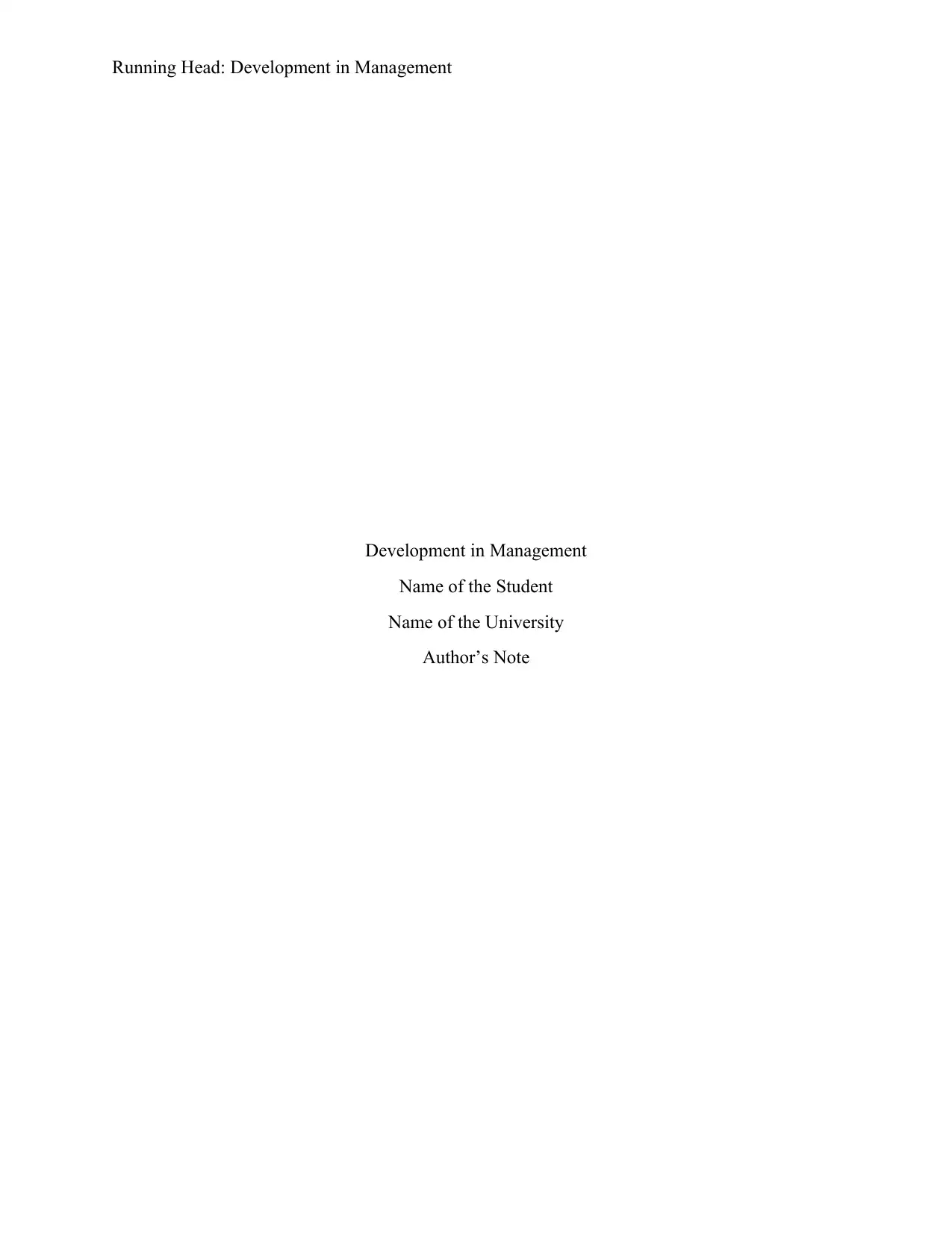
Running Head: Development in Management
Development in Management
Name of the Student
Name of the University
Author’s Note
Development in Management
Name of the Student
Name of the University
Author’s Note
Paraphrase This Document
Need a fresh take? Get an instant paraphrase of this document with our AI Paraphraser
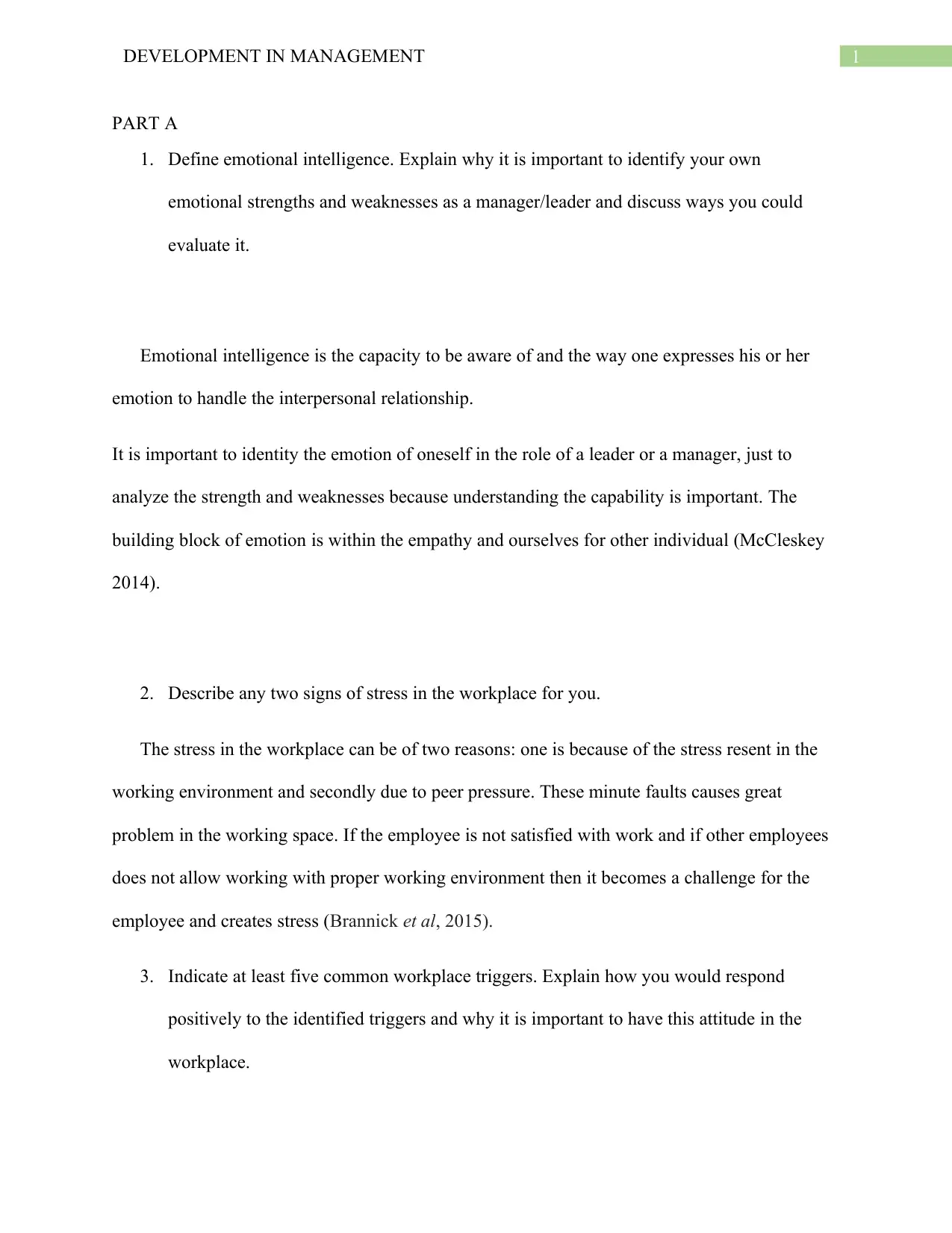
1DEVELOPMENT IN MANAGEMENT
PART A
1. Define emotional intelligence. Explain why it is important to identify your own
emotional strengths and weaknesses as a manager/leader and discuss ways you could
evaluate it.
Emotional intelligence is the capacity to be aware of and the way one expresses his or her
emotion to handle the interpersonal relationship.
It is important to identity the emotion of oneself in the role of a leader or a manager, just to
analyze the strength and weaknesses because understanding the capability is important. The
building block of emotion is within the empathy and ourselves for other individual (McCleskey
2014).
2. Describe any two signs of stress in the workplace for you.
The stress in the workplace can be of two reasons: one is because of the stress resent in the
working environment and secondly due to peer pressure. These minute faults causes great
problem in the working space. If the employee is not satisfied with work and if other employees
does not allow working with proper working environment then it becomes a challenge for the
employee and creates stress (Brannick et al, 2015).
3. Indicate at least five common workplace triggers. Explain how you would respond
positively to the identified triggers and why it is important to have this attitude in the
workplace.
PART A
1. Define emotional intelligence. Explain why it is important to identify your own
emotional strengths and weaknesses as a manager/leader and discuss ways you could
evaluate it.
Emotional intelligence is the capacity to be aware of and the way one expresses his or her
emotion to handle the interpersonal relationship.
It is important to identity the emotion of oneself in the role of a leader or a manager, just to
analyze the strength and weaknesses because understanding the capability is important. The
building block of emotion is within the empathy and ourselves for other individual (McCleskey
2014).
2. Describe any two signs of stress in the workplace for you.
The stress in the workplace can be of two reasons: one is because of the stress resent in the
working environment and secondly due to peer pressure. These minute faults causes great
problem in the working space. If the employee is not satisfied with work and if other employees
does not allow working with proper working environment then it becomes a challenge for the
employee and creates stress (Brannick et al, 2015).
3. Indicate at least five common workplace triggers. Explain how you would respond
positively to the identified triggers and why it is important to have this attitude in the
workplace.
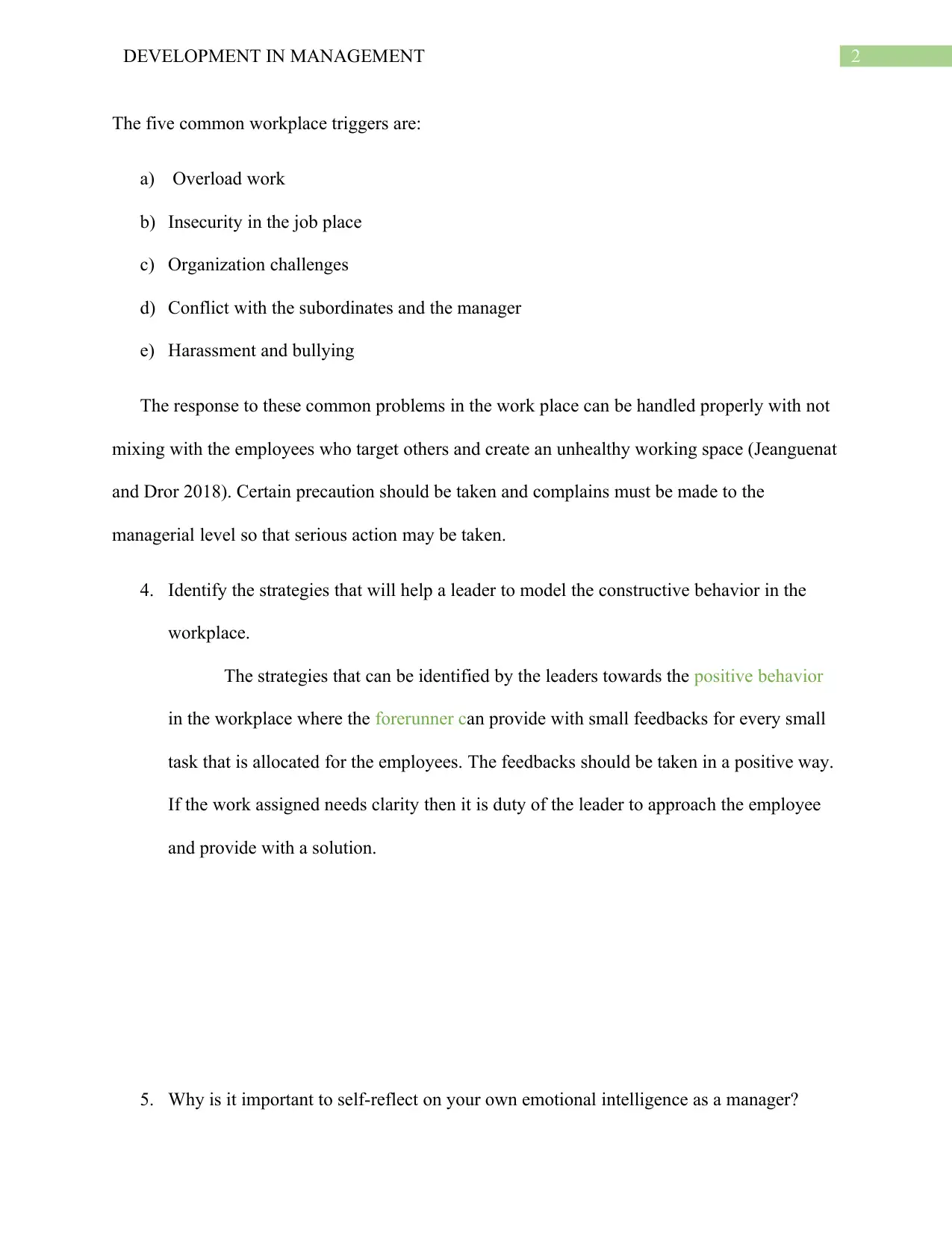
2DEVELOPMENT IN MANAGEMENT
The five common workplace triggers are:
a) Overload work
b) Insecurity in the job place
c) Organization challenges
d) Conflict with the subordinates and the manager
e) Harassment and bullying
The response to these common problems in the work place can be handled properly with not
mixing with the employees who target others and create an unhealthy working space (Jeanguenat
and Dror 2018). Certain precaution should be taken and complains must be made to the
managerial level so that serious action may be taken.
4. Identify the strategies that will help a leader to model the constructive behavior in the
workplace.
The strategies that can be identified by the leaders towards the positive behavior
in the workplace where the forerunner can provide with small feedbacks for every small
task that is allocated for the employees. The feedbacks should be taken in a positive way.
If the work assigned needs clarity then it is duty of the leader to approach the employee
and provide with a solution.
5. Why is it important to self-reflect on your own emotional intelligence as a manager?
The five common workplace triggers are:
a) Overload work
b) Insecurity in the job place
c) Organization challenges
d) Conflict with the subordinates and the manager
e) Harassment and bullying
The response to these common problems in the work place can be handled properly with not
mixing with the employees who target others and create an unhealthy working space (Jeanguenat
and Dror 2018). Certain precaution should be taken and complains must be made to the
managerial level so that serious action may be taken.
4. Identify the strategies that will help a leader to model the constructive behavior in the
workplace.
The strategies that can be identified by the leaders towards the positive behavior
in the workplace where the forerunner can provide with small feedbacks for every small
task that is allocated for the employees. The feedbacks should be taken in a positive way.
If the work assigned needs clarity then it is duty of the leader to approach the employee
and provide with a solution.
5. Why is it important to self-reflect on your own emotional intelligence as a manager?
⊘ This is a preview!⊘
Do you want full access?
Subscribe today to unlock all pages.

Trusted by 1+ million students worldwide
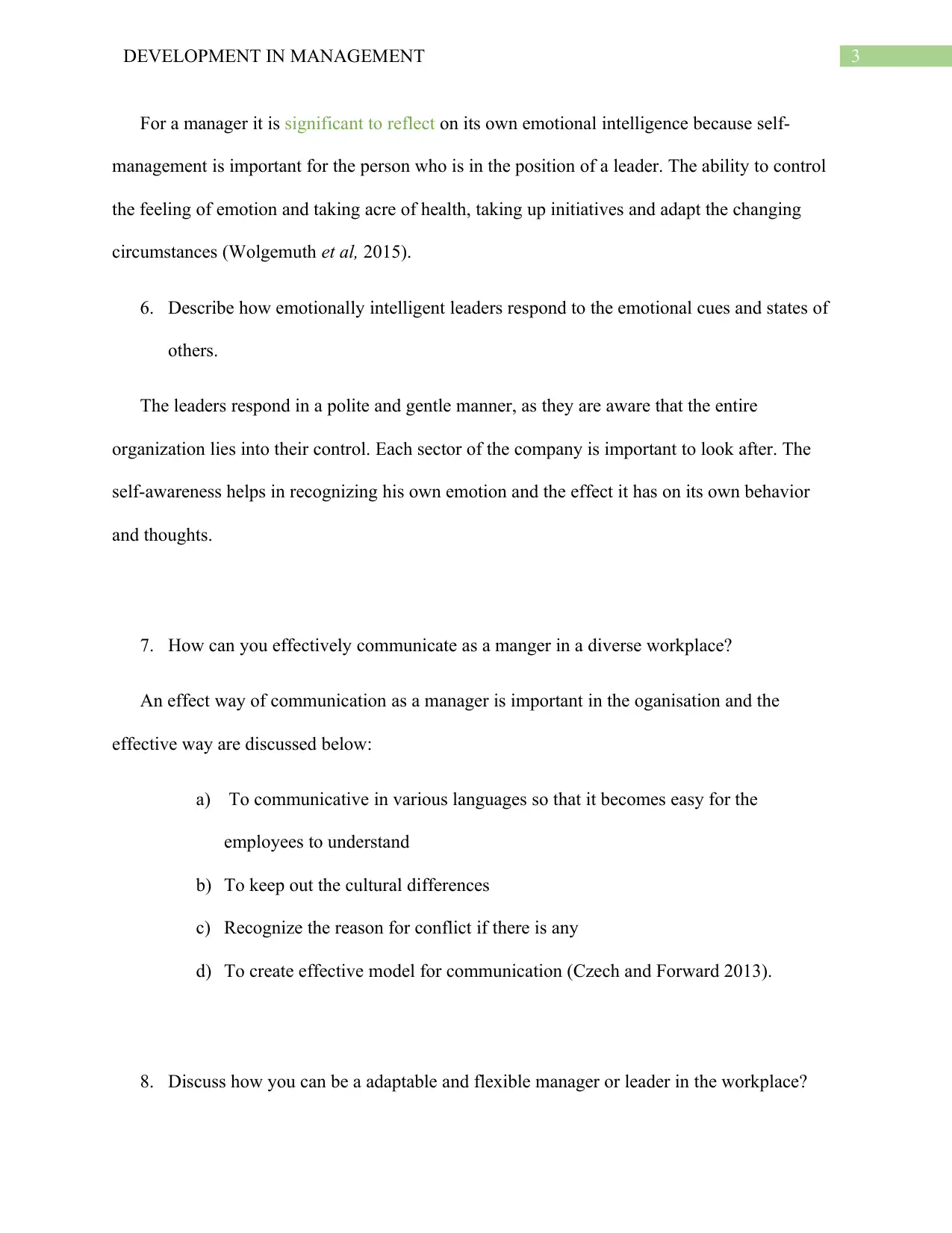
3DEVELOPMENT IN MANAGEMENT
For a manager it is significant to reflect on its own emotional intelligence because self-
management is important for the person who is in the position of a leader. The ability to control
the feeling of emotion and taking acre of health, taking up initiatives and adapt the changing
circumstances (Wolgemuth et al, 2015).
6. Describe how emotionally intelligent leaders respond to the emotional cues and states of
others.
The leaders respond in a polite and gentle manner, as they are aware that the entire
organization lies into their control. Each sector of the company is important to look after. The
self-awareness helps in recognizing his own emotion and the effect it has on its own behavior
and thoughts.
7. How can you effectively communicate as a manger in a diverse workplace?
An effect way of communication as a manager is important in the oganisation and the
effective way are discussed below:
a) To communicative in various languages so that it becomes easy for the
employees to understand
b) To keep out the cultural differences
c) Recognize the reason for conflict if there is any
d) To create effective model for communication (Czech and Forward 2013).
8. Discuss how you can be a adaptable and flexible manager or leader in the workplace?
For a manager it is significant to reflect on its own emotional intelligence because self-
management is important for the person who is in the position of a leader. The ability to control
the feeling of emotion and taking acre of health, taking up initiatives and adapt the changing
circumstances (Wolgemuth et al, 2015).
6. Describe how emotionally intelligent leaders respond to the emotional cues and states of
others.
The leaders respond in a polite and gentle manner, as they are aware that the entire
organization lies into their control. Each sector of the company is important to look after. The
self-awareness helps in recognizing his own emotion and the effect it has on its own behavior
and thoughts.
7. How can you effectively communicate as a manger in a diverse workplace?
An effect way of communication as a manager is important in the oganisation and the
effective way are discussed below:
a) To communicative in various languages so that it becomes easy for the
employees to understand
b) To keep out the cultural differences
c) Recognize the reason for conflict if there is any
d) To create effective model for communication (Czech and Forward 2013).
8. Discuss how you can be a adaptable and flexible manager or leader in the workplace?
Paraphrase This Document
Need a fresh take? Get an instant paraphrase of this document with our AI Paraphraser
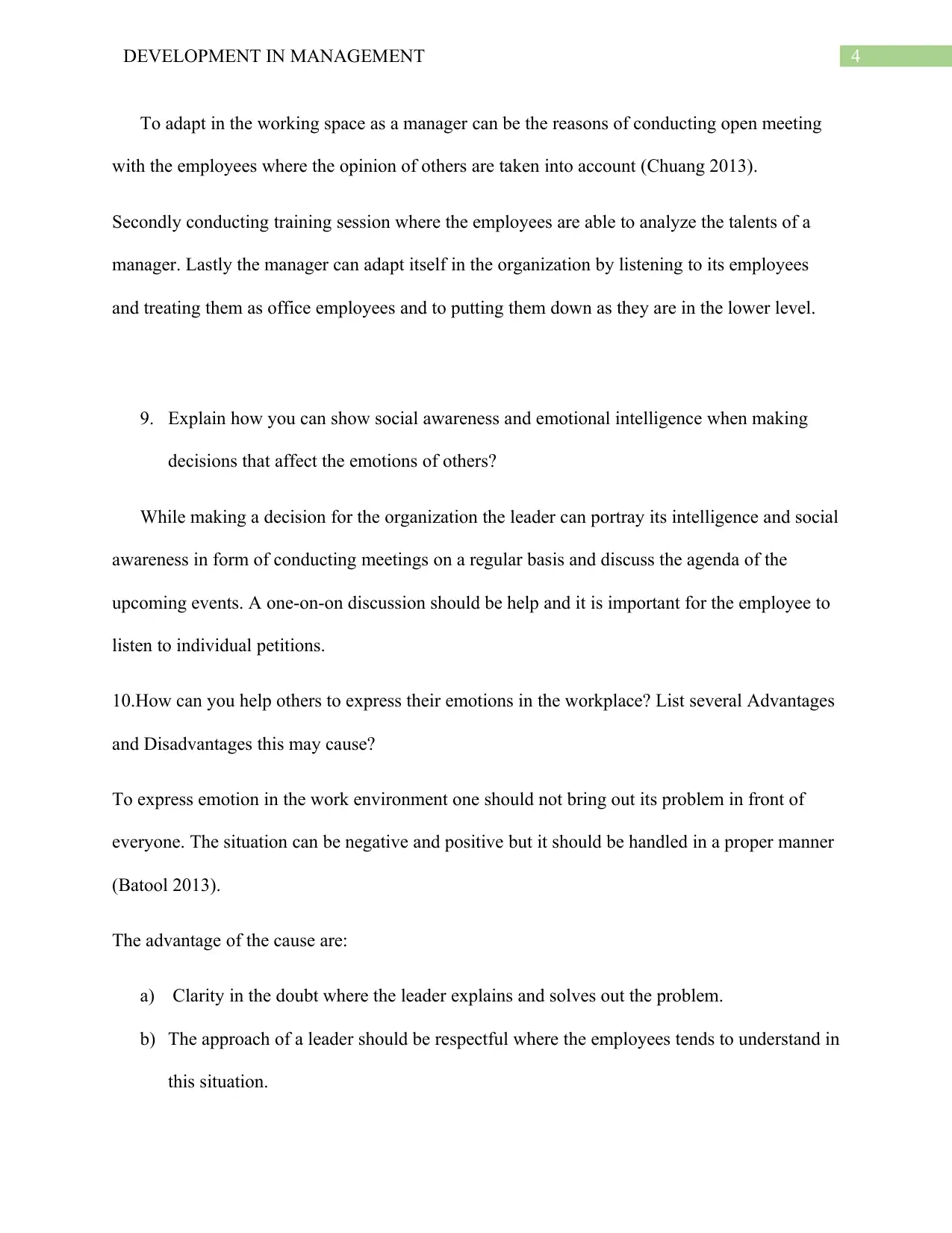
4DEVELOPMENT IN MANAGEMENT
To adapt in the working space as a manager can be the reasons of conducting open meeting
with the employees where the opinion of others are taken into account (Chuang 2013).
Secondly conducting training session where the employees are able to analyze the talents of a
manager. Lastly the manager can adapt itself in the organization by listening to its employees
and treating them as office employees and to putting them down as they are in the lower level.
9. Explain how you can show social awareness and emotional intelligence when making
decisions that affect the emotions of others?
While making a decision for the organization the leader can portray its intelligence and social
awareness in form of conducting meetings on a regular basis and discuss the agenda of the
upcoming events. A one-on-on discussion should be help and it is important for the employee to
listen to individual petitions.
10.How can you help others to express their emotions in the workplace? List several Advantages
and Disadvantages this may cause?
To express emotion in the work environment one should not bring out its problem in front of
everyone. The situation can be negative and positive but it should be handled in a proper manner
(Batool 2013).
The advantage of the cause are:
a) Clarity in the doubt where the leader explains and solves out the problem.
b) The approach of a leader should be respectful where the employees tends to understand in
this situation.
To adapt in the working space as a manager can be the reasons of conducting open meeting
with the employees where the opinion of others are taken into account (Chuang 2013).
Secondly conducting training session where the employees are able to analyze the talents of a
manager. Lastly the manager can adapt itself in the organization by listening to its employees
and treating them as office employees and to putting them down as they are in the lower level.
9. Explain how you can show social awareness and emotional intelligence when making
decisions that affect the emotions of others?
While making a decision for the organization the leader can portray its intelligence and social
awareness in form of conducting meetings on a regular basis and discuss the agenda of the
upcoming events. A one-on-on discussion should be help and it is important for the employee to
listen to individual petitions.
10.How can you help others to express their emotions in the workplace? List several Advantages
and Disadvantages this may cause?
To express emotion in the work environment one should not bring out its problem in front of
everyone. The situation can be negative and positive but it should be handled in a proper manner
(Batool 2013).
The advantage of the cause are:
a) Clarity in the doubt where the leader explains and solves out the problem.
b) The approach of a leader should be respectful where the employees tends to understand in
this situation.
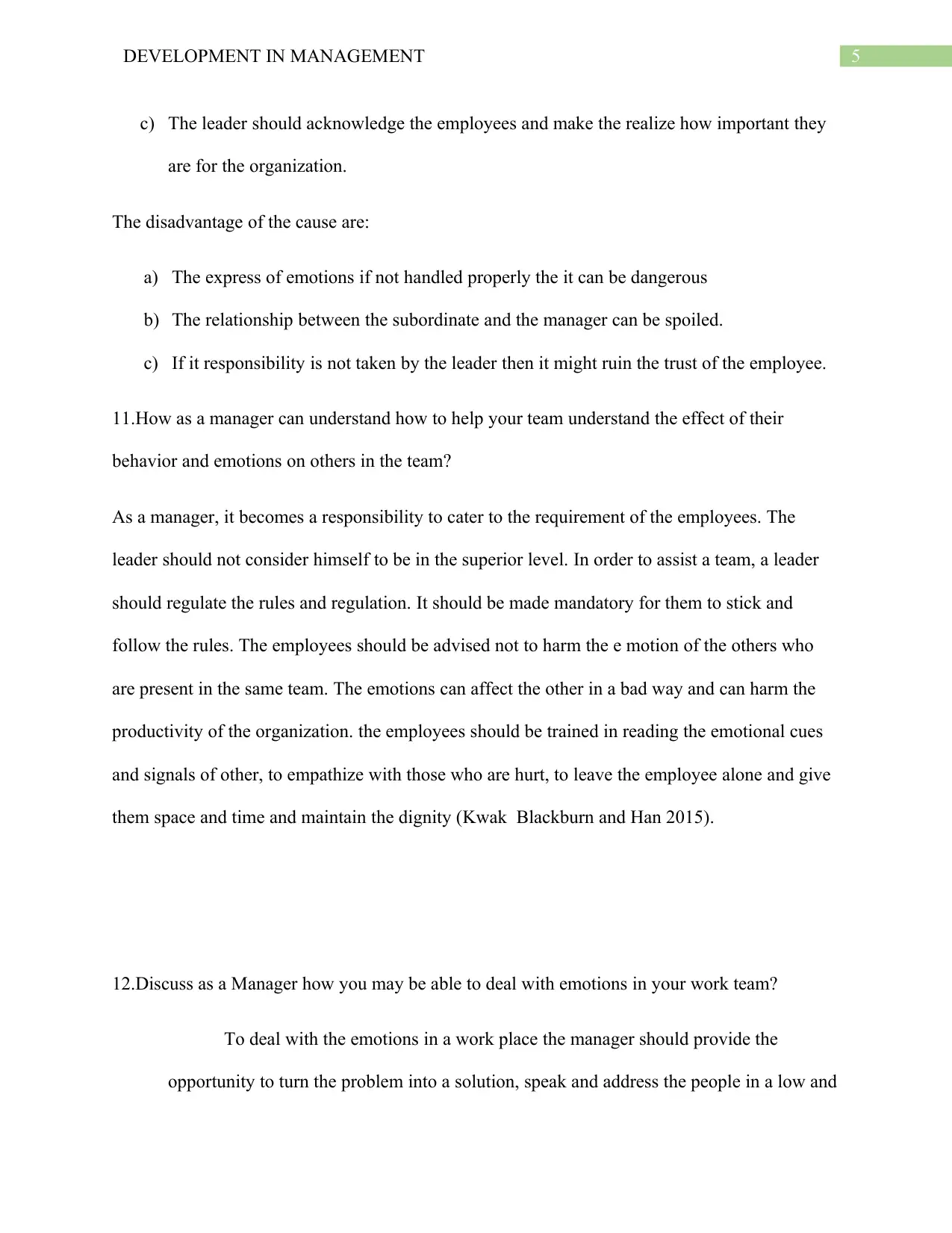
5DEVELOPMENT IN MANAGEMENT
c) The leader should acknowledge the employees and make the realize how important they
are for the organization.
The disadvantage of the cause are:
a) The express of emotions if not handled properly the it can be dangerous
b) The relationship between the subordinate and the manager can be spoiled.
c) If it responsibility is not taken by the leader then it might ruin the trust of the employee.
11.How as a manager can understand how to help your team understand the effect of their
behavior and emotions on others in the team?
As a manager, it becomes a responsibility to cater to the requirement of the employees. The
leader should not consider himself to be in the superior level. In order to assist a team, a leader
should regulate the rules and regulation. It should be made mandatory for them to stick and
follow the rules. The employees should be advised not to harm the e motion of the others who
are present in the same team. The emotions can affect the other in a bad way and can harm the
productivity of the organization. the employees should be trained in reading the emotional cues
and signals of other, to empathize with those who are hurt, to leave the employee alone and give
them space and time and maintain the dignity (Kwak Blackburn and Han 2015).
12.Discuss as a Manager how you may be able to deal with emotions in your work team?
To deal with the emotions in a work place the manager should provide the
opportunity to turn the problem into a solution, speak and address the people in a low and
c) The leader should acknowledge the employees and make the realize how important they
are for the organization.
The disadvantage of the cause are:
a) The express of emotions if not handled properly the it can be dangerous
b) The relationship between the subordinate and the manager can be spoiled.
c) If it responsibility is not taken by the leader then it might ruin the trust of the employee.
11.How as a manager can understand how to help your team understand the effect of their
behavior and emotions on others in the team?
As a manager, it becomes a responsibility to cater to the requirement of the employees. The
leader should not consider himself to be in the superior level. In order to assist a team, a leader
should regulate the rules and regulation. It should be made mandatory for them to stick and
follow the rules. The employees should be advised not to harm the e motion of the others who
are present in the same team. The emotions can affect the other in a bad way and can harm the
productivity of the organization. the employees should be trained in reading the emotional cues
and signals of other, to empathize with those who are hurt, to leave the employee alone and give
them space and time and maintain the dignity (Kwak Blackburn and Han 2015).
12.Discuss as a Manager how you may be able to deal with emotions in your work team?
To deal with the emotions in a work place the manager should provide the
opportunity to turn the problem into a solution, speak and address the people in a low and
⊘ This is a preview!⊘
Do you want full access?
Subscribe today to unlock all pages.

Trusted by 1+ million students worldwide
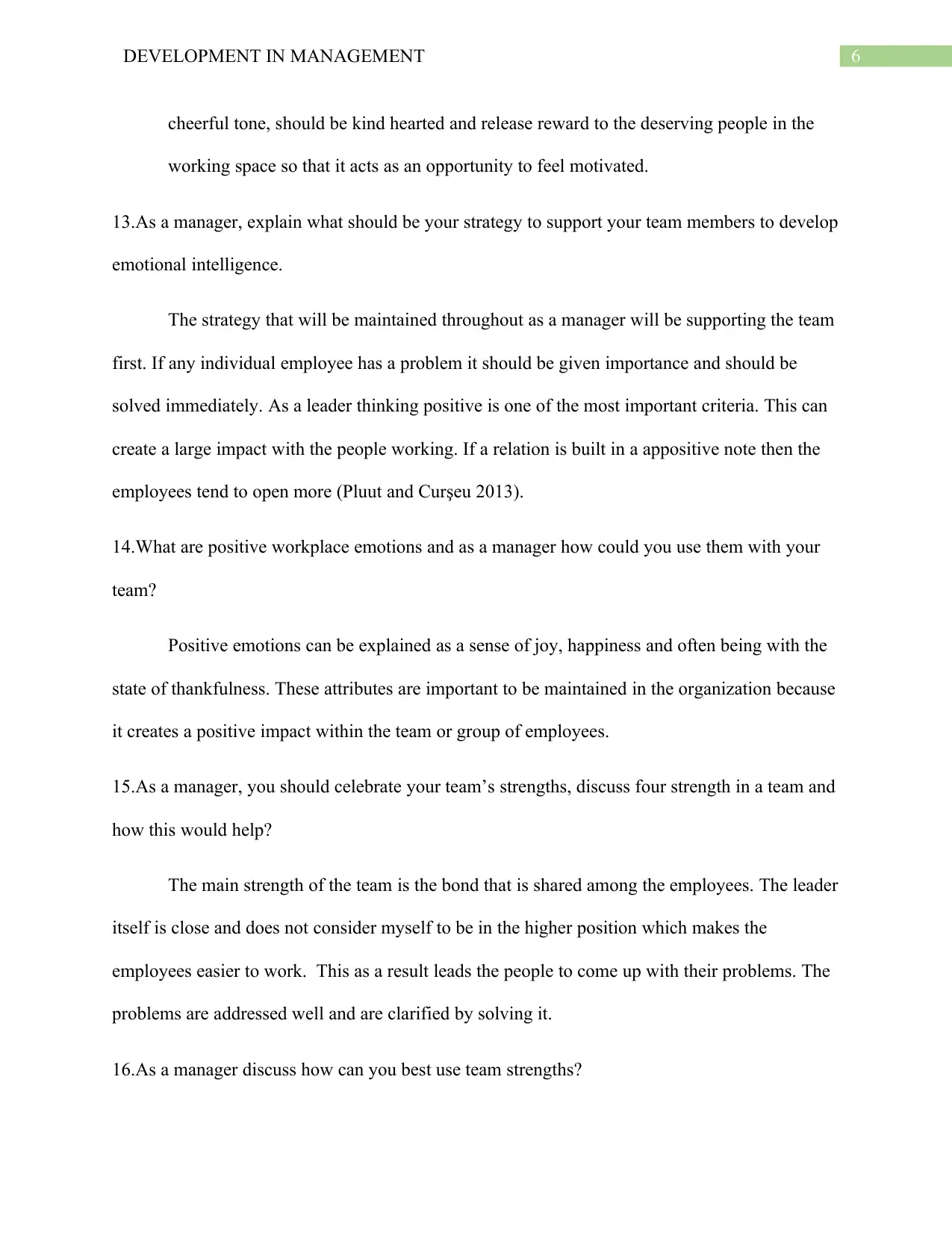
6DEVELOPMENT IN MANAGEMENT
cheerful tone, should be kind hearted and release reward to the deserving people in the
working space so that it acts as an opportunity to feel motivated.
13.As a manager, explain what should be your strategy to support your team members to develop
emotional intelligence.
The strategy that will be maintained throughout as a manager will be supporting the team
first. If any individual employee has a problem it should be given importance and should be
solved immediately. As a leader thinking positive is one of the most important criteria. This can
create a large impact with the people working. If a relation is built in a appositive note then the
employees tend to open more (Pluut and Curşeu 2013).
14.What are positive workplace emotions and as a manager how could you use them with your
team?
Positive emotions can be explained as a sense of joy, happiness and often being with the
state of thankfulness. These attributes are important to be maintained in the organization because
it creates a positive impact within the team or group of employees.
15.As a manager, you should celebrate your team’s strengths, discuss four strength in a team and
how this would help?
The main strength of the team is the bond that is shared among the employees. The leader
itself is close and does not consider myself to be in the higher position which makes the
employees easier to work. This as a result leads the people to come up with their problems. The
problems are addressed well and are clarified by solving it.
16.As a manager discuss how can you best use team strengths?
cheerful tone, should be kind hearted and release reward to the deserving people in the
working space so that it acts as an opportunity to feel motivated.
13.As a manager, explain what should be your strategy to support your team members to develop
emotional intelligence.
The strategy that will be maintained throughout as a manager will be supporting the team
first. If any individual employee has a problem it should be given importance and should be
solved immediately. As a leader thinking positive is one of the most important criteria. This can
create a large impact with the people working. If a relation is built in a appositive note then the
employees tend to open more (Pluut and Curşeu 2013).
14.What are positive workplace emotions and as a manager how could you use them with your
team?
Positive emotions can be explained as a sense of joy, happiness and often being with the
state of thankfulness. These attributes are important to be maintained in the organization because
it creates a positive impact within the team or group of employees.
15.As a manager, you should celebrate your team’s strengths, discuss four strength in a team and
how this would help?
The main strength of the team is the bond that is shared among the employees. The leader
itself is close and does not consider myself to be in the higher position which makes the
employees easier to work. This as a result leads the people to come up with their problems. The
problems are addressed well and are clarified by solving it.
16.As a manager discuss how can you best use team strengths?
Paraphrase This Document
Need a fresh take? Get an instant paraphrase of this document with our AI Paraphraser
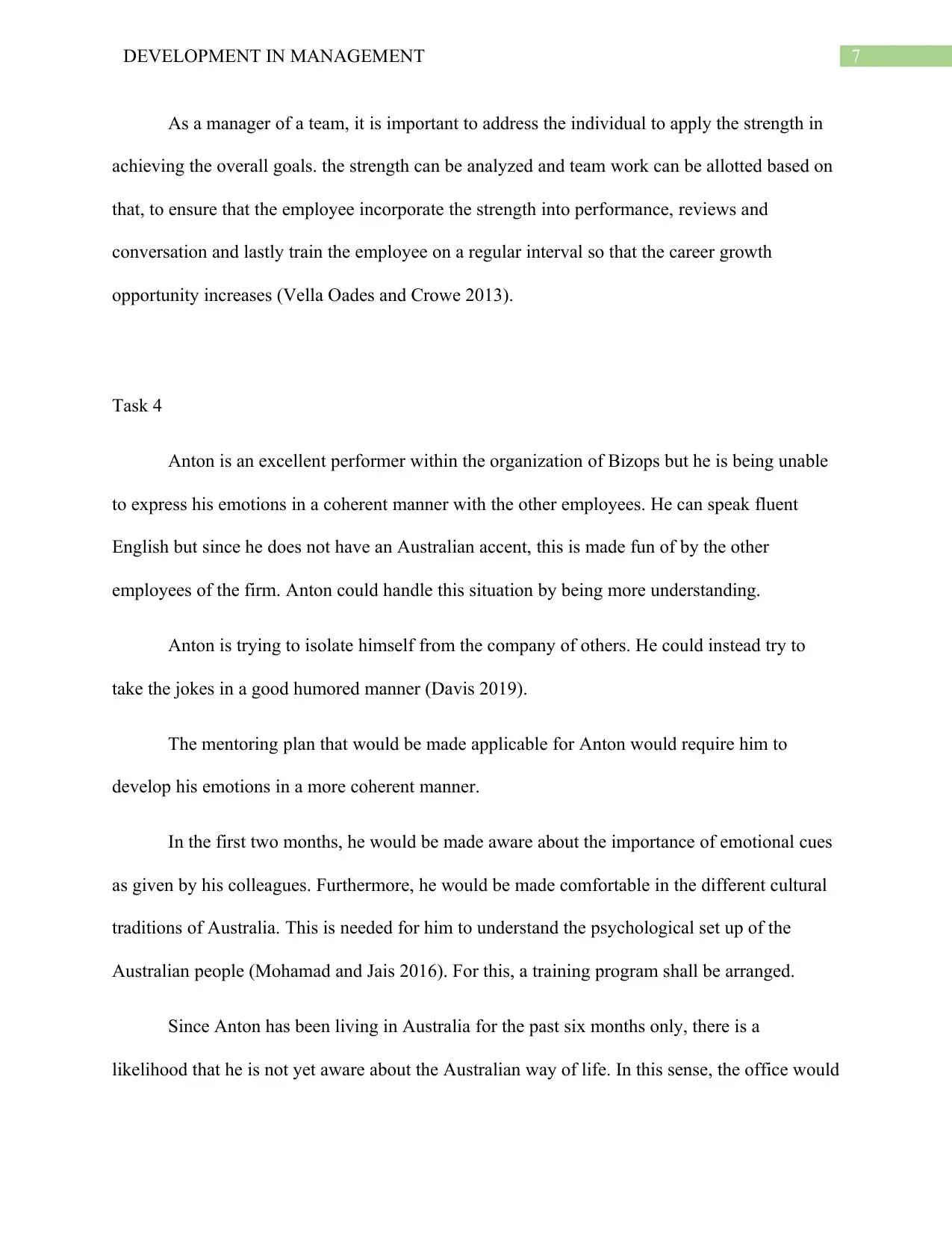
7DEVELOPMENT IN MANAGEMENT
As a manager of a team, it is important to address the individual to apply the strength in
achieving the overall goals. the strength can be analyzed and team work can be allotted based on
that, to ensure that the employee incorporate the strength into performance, reviews and
conversation and lastly train the employee on a regular interval so that the career growth
opportunity increases (Vella Oades and Crowe 2013).
Task 4
Anton is an excellent performer within the organization of Bizops but he is being unable
to express his emotions in a coherent manner with the other employees. He can speak fluent
English but since he does not have an Australian accent, this is made fun of by the other
employees of the firm. Anton could handle this situation by being more understanding.
Anton is trying to isolate himself from the company of others. He could instead try to
take the jokes in a good humored manner (Davis 2019).
The mentoring plan that would be made applicable for Anton would require him to
develop his emotions in a more coherent manner.
In the first two months, he would be made aware about the importance of emotional cues
as given by his colleagues. Furthermore, he would be made comfortable in the different cultural
traditions of Australia. This is needed for him to understand the psychological set up of the
Australian people (Mohamad and Jais 2016). For this, a training program shall be arranged.
Since Anton has been living in Australia for the past six months only, there is a
likelihood that he is not yet aware about the Australian way of life. In this sense, the office would
As a manager of a team, it is important to address the individual to apply the strength in
achieving the overall goals. the strength can be analyzed and team work can be allotted based on
that, to ensure that the employee incorporate the strength into performance, reviews and
conversation and lastly train the employee on a regular interval so that the career growth
opportunity increases (Vella Oades and Crowe 2013).
Task 4
Anton is an excellent performer within the organization of Bizops but he is being unable
to express his emotions in a coherent manner with the other employees. He can speak fluent
English but since he does not have an Australian accent, this is made fun of by the other
employees of the firm. Anton could handle this situation by being more understanding.
Anton is trying to isolate himself from the company of others. He could instead try to
take the jokes in a good humored manner (Davis 2019).
The mentoring plan that would be made applicable for Anton would require him to
develop his emotions in a more coherent manner.
In the first two months, he would be made aware about the importance of emotional cues
as given by his colleagues. Furthermore, he would be made comfortable in the different cultural
traditions of Australia. This is needed for him to understand the psychological set up of the
Australian people (Mohamad and Jais 2016). For this, a training program shall be arranged.
Since Anton has been living in Australia for the past six months only, there is a
likelihood that he is not yet aware about the Australian way of life. In this sense, the office would
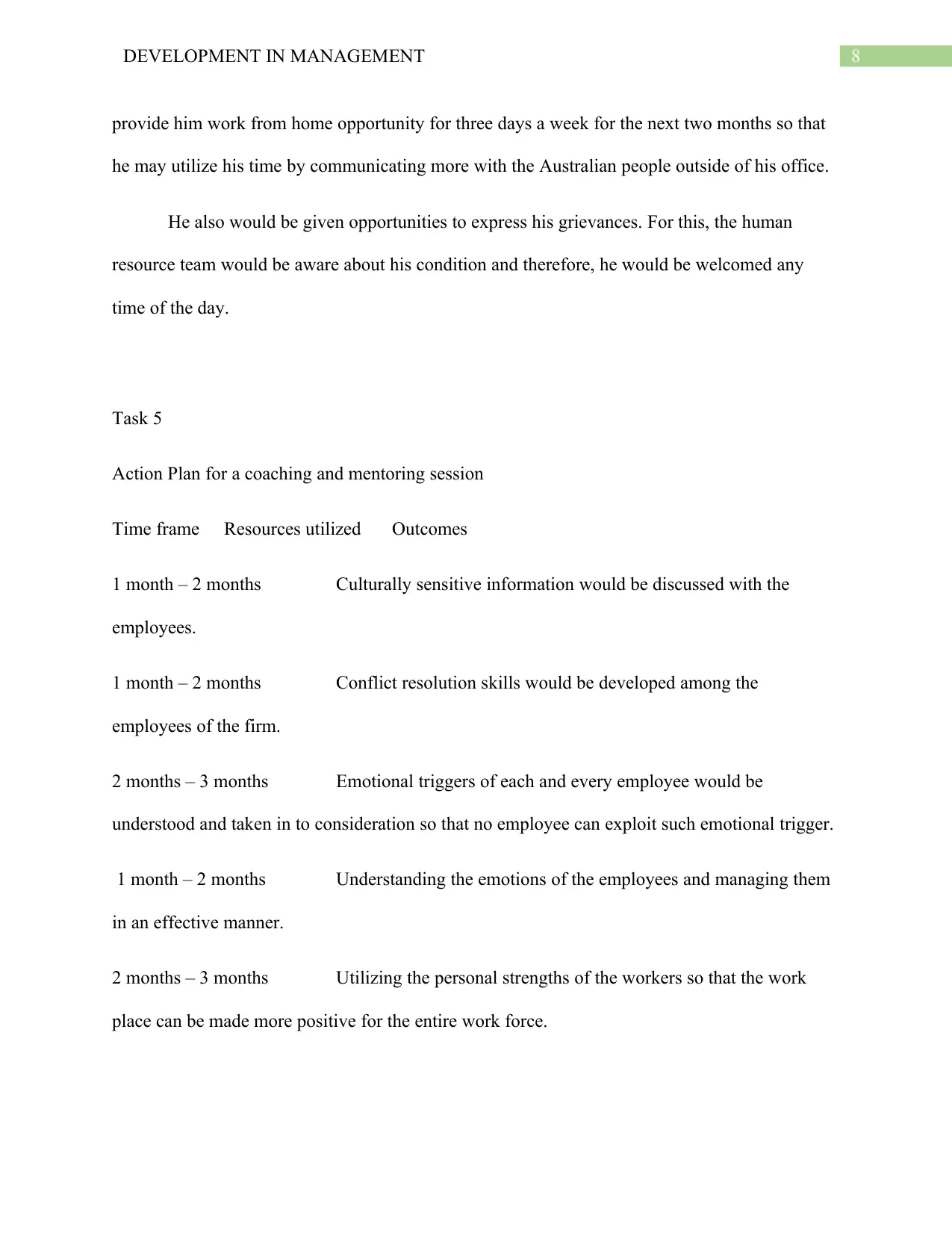
8DEVELOPMENT IN MANAGEMENT
provide him work from home opportunity for three days a week for the next two months so that
he may utilize his time by communicating more with the Australian people outside of his office.
He also would be given opportunities to express his grievances. For this, the human
resource team would be aware about his condition and therefore, he would be welcomed any
time of the day.
Task 5
Action Plan for a coaching and mentoring session
Time frame Resources utilized Outcomes
1 month – 2 months Culturally sensitive information would be discussed with the
employees.
1 month – 2 months Conflict resolution skills would be developed among the
employees of the firm.
2 months – 3 months Emotional triggers of each and every employee would be
understood and taken in to consideration so that no employee can exploit such emotional trigger.
1 month – 2 months Understanding the emotions of the employees and managing them
in an effective manner.
2 months – 3 months Utilizing the personal strengths of the workers so that the work
place can be made more positive for the entire work force.
provide him work from home opportunity for three days a week for the next two months so that
he may utilize his time by communicating more with the Australian people outside of his office.
He also would be given opportunities to express his grievances. For this, the human
resource team would be aware about his condition and therefore, he would be welcomed any
time of the day.
Task 5
Action Plan for a coaching and mentoring session
Time frame Resources utilized Outcomes
1 month – 2 months Culturally sensitive information would be discussed with the
employees.
1 month – 2 months Conflict resolution skills would be developed among the
employees of the firm.
2 months – 3 months Emotional triggers of each and every employee would be
understood and taken in to consideration so that no employee can exploit such emotional trigger.
1 month – 2 months Understanding the emotions of the employees and managing them
in an effective manner.
2 months – 3 months Utilizing the personal strengths of the workers so that the work
place can be made more positive for the entire work force.
⊘ This is a preview!⊘
Do you want full access?
Subscribe today to unlock all pages.

Trusted by 1+ million students worldwide
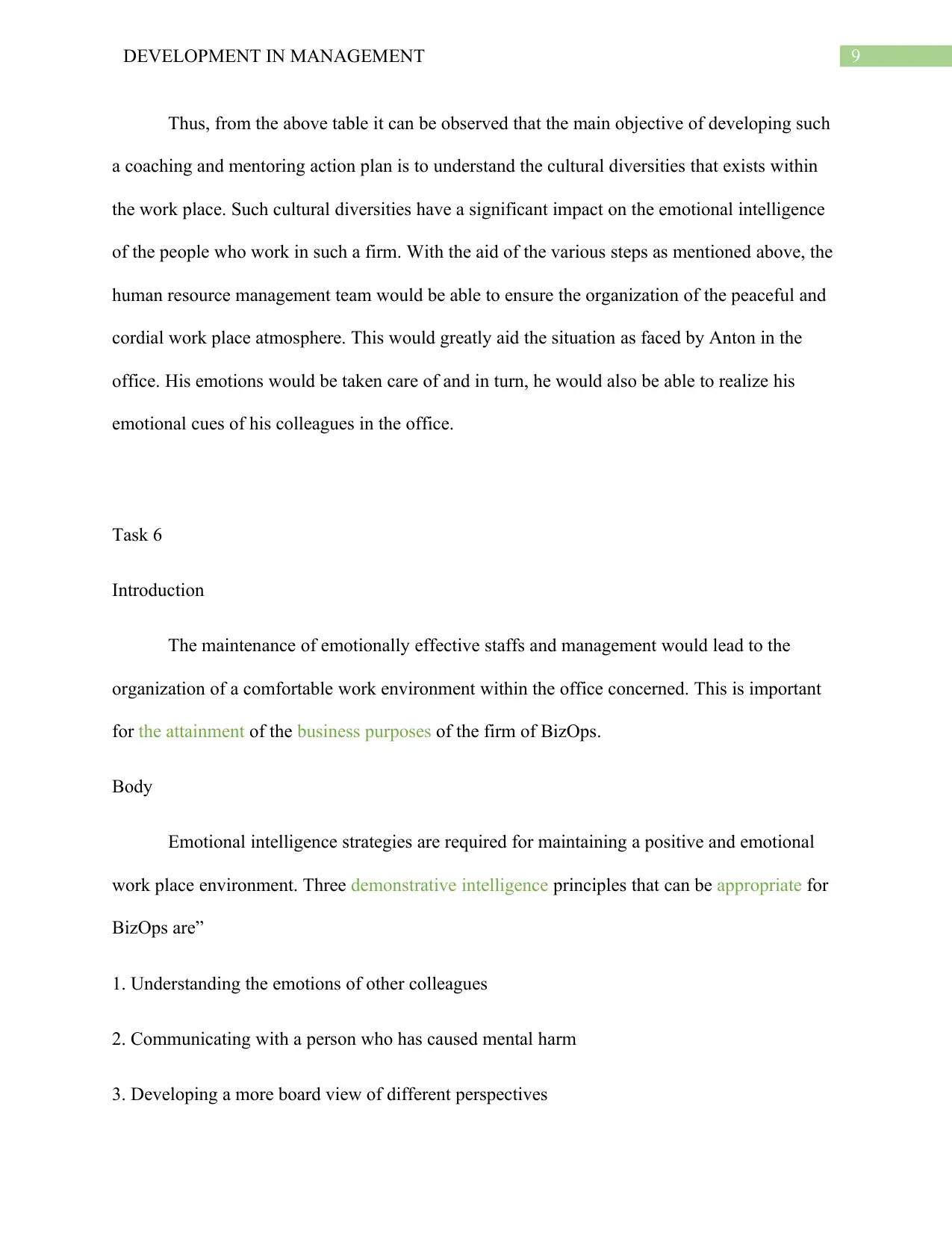
9DEVELOPMENT IN MANAGEMENT
Thus, from the above table it can be observed that the main objective of developing such
a coaching and mentoring action plan is to understand the cultural diversities that exists within
the work place. Such cultural diversities have a significant impact on the emotional intelligence
of the people who work in such a firm. With the aid of the various steps as mentioned above, the
human resource management team would be able to ensure the organization of the peaceful and
cordial work place atmosphere. This would greatly aid the situation as faced by Anton in the
office. His emotions would be taken care of and in turn, he would also be able to realize his
emotional cues of his colleagues in the office.
Task 6
Introduction
The maintenance of emotionally effective staffs and management would lead to the
organization of a comfortable work environment within the office concerned. This is important
for the attainment of the business purposes of the firm of BizOps.
Body
Emotional intelligence strategies are required for maintaining a positive and emotional
work place environment. Three demonstrative intelligence principles that can be appropriate for
BizOps are”
1. Understanding the emotions of other colleagues
2. Communicating with a person who has caused mental harm
3. Developing a more board view of different perspectives
Thus, from the above table it can be observed that the main objective of developing such
a coaching and mentoring action plan is to understand the cultural diversities that exists within
the work place. Such cultural diversities have a significant impact on the emotional intelligence
of the people who work in such a firm. With the aid of the various steps as mentioned above, the
human resource management team would be able to ensure the organization of the peaceful and
cordial work place atmosphere. This would greatly aid the situation as faced by Anton in the
office. His emotions would be taken care of and in turn, he would also be able to realize his
emotional cues of his colleagues in the office.
Task 6
Introduction
The maintenance of emotionally effective staffs and management would lead to the
organization of a comfortable work environment within the office concerned. This is important
for the attainment of the business purposes of the firm of BizOps.
Body
Emotional intelligence strategies are required for maintaining a positive and emotional
work place environment. Three demonstrative intelligence principles that can be appropriate for
BizOps are”
1. Understanding the emotions of other colleagues
2. Communicating with a person who has caused mental harm
3. Developing a more board view of different perspectives
Paraphrase This Document
Need a fresh take? Get an instant paraphrase of this document with our AI Paraphraser
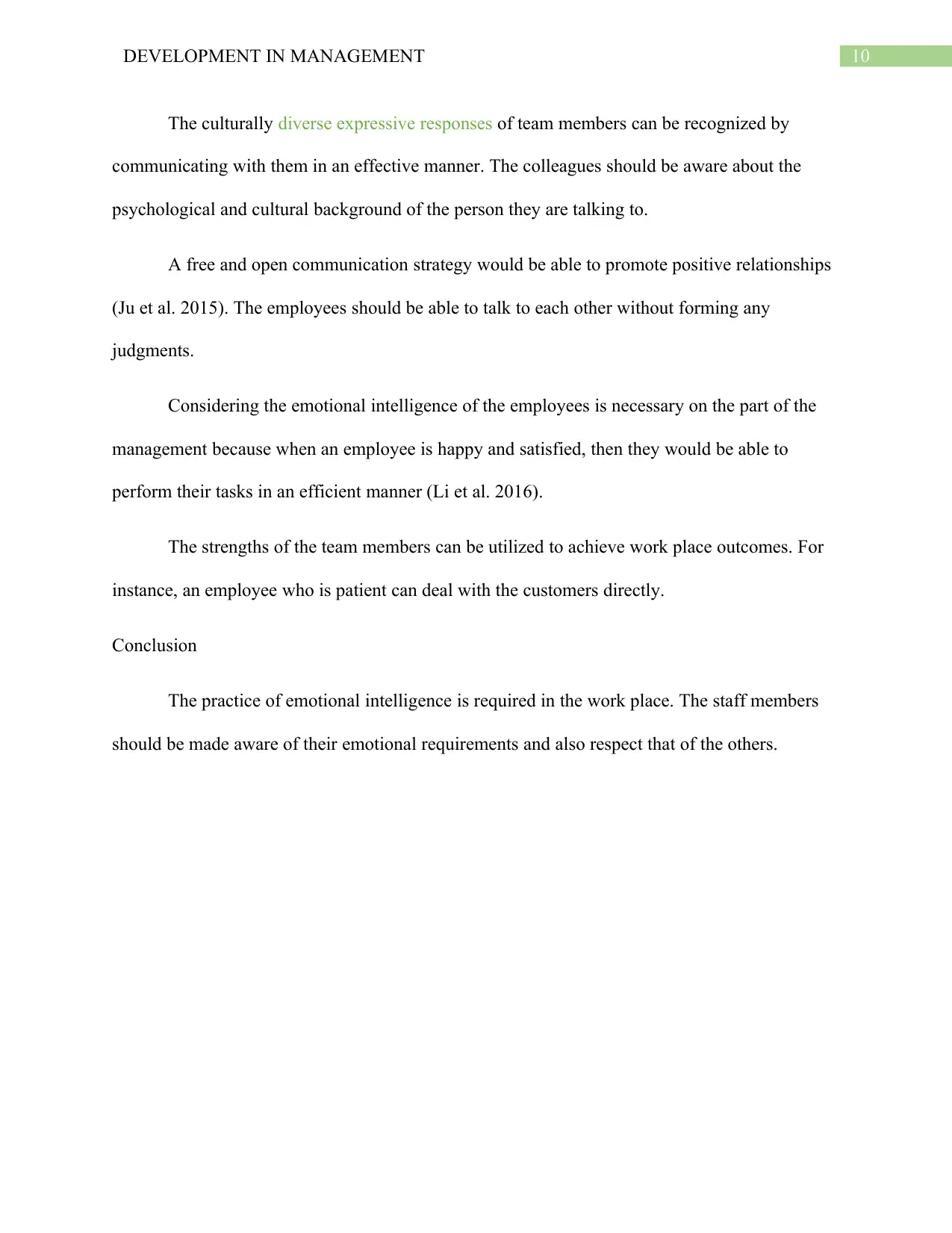
10DEVELOPMENT IN MANAGEMENT
The culturally diverse expressive responses of team members can be recognized by
communicating with them in an effective manner. The colleagues should be aware about the
psychological and cultural background of the person they are talking to.
A free and open communication strategy would be able to promote positive relationships
(Ju et al. 2015). The employees should be able to talk to each other without forming any
judgments.
Considering the emotional intelligence of the employees is necessary on the part of the
management because when an employee is happy and satisfied, then they would be able to
perform their tasks in an efficient manner (Li et al. 2016).
The strengths of the team members can be utilized to achieve work place outcomes. For
instance, an employee who is patient can deal with the customers directly.
Conclusion
The practice of emotional intelligence is required in the work place. The staff members
should be made aware of their emotional requirements and also respect that of the others.
The culturally diverse expressive responses of team members can be recognized by
communicating with them in an effective manner. The colleagues should be aware about the
psychological and cultural background of the person they are talking to.
A free and open communication strategy would be able to promote positive relationships
(Ju et al. 2015). The employees should be able to talk to each other without forming any
judgments.
Considering the emotional intelligence of the employees is necessary on the part of the
management because when an employee is happy and satisfied, then they would be able to
perform their tasks in an efficient manner (Li et al. 2016).
The strengths of the team members can be utilized to achieve work place outcomes. For
instance, an employee who is patient can deal with the customers directly.
Conclusion
The practice of emotional intelligence is required in the work place. The staff members
should be made aware of their emotional requirements and also respect that of the others.
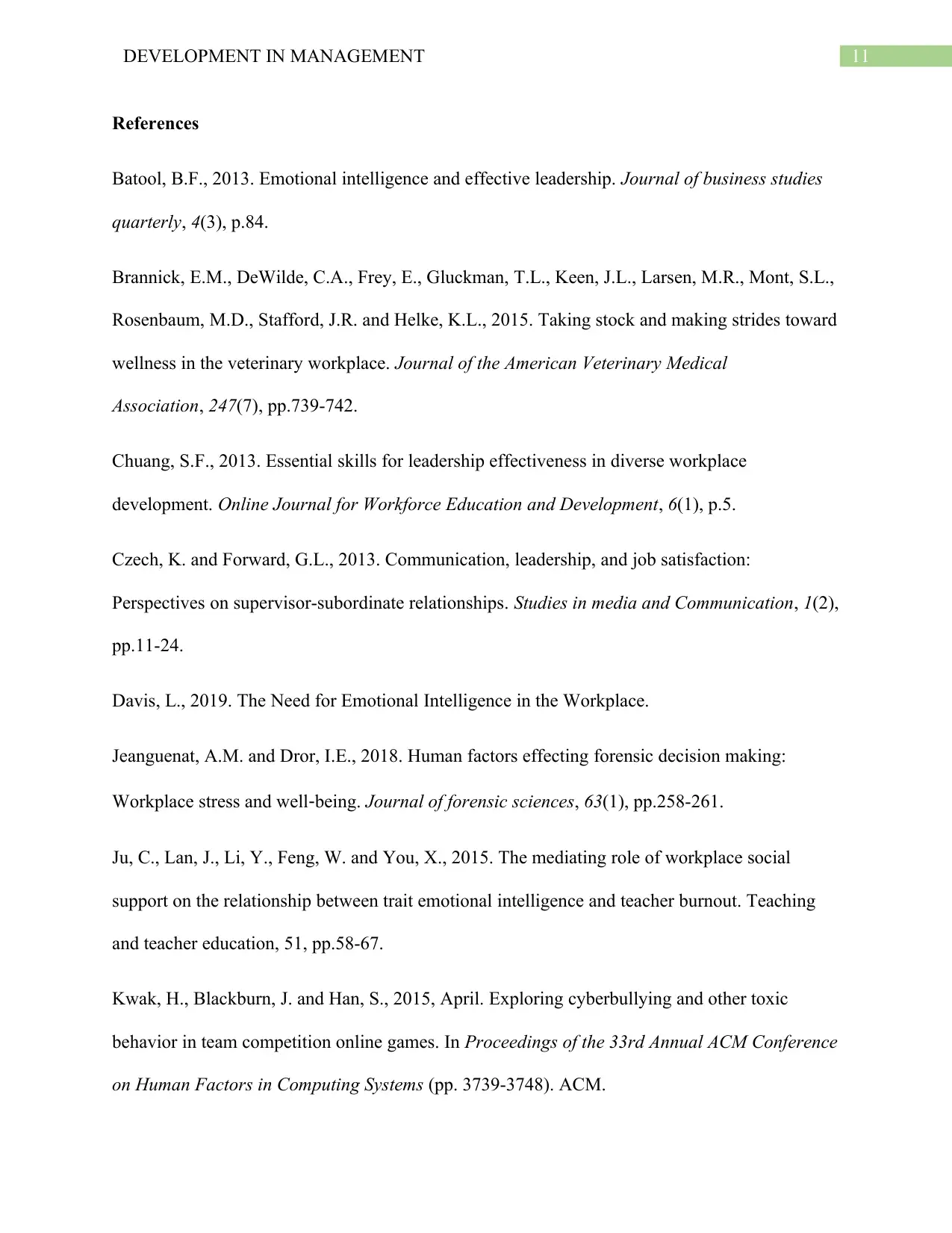
11DEVELOPMENT IN MANAGEMENT
References
Batool, B.F., 2013. Emotional intelligence and effective leadership. Journal of business studies
quarterly, 4(3), p.84.
Brannick, E.M., DeWilde, C.A., Frey, E., Gluckman, T.L., Keen, J.L., Larsen, M.R., Mont, S.L.,
Rosenbaum, M.D., Stafford, J.R. and Helke, K.L., 2015. Taking stock and making strides toward
wellness in the veterinary workplace. Journal of the American Veterinary Medical
Association, 247(7), pp.739-742.
Chuang, S.F., 2013. Essential skills for leadership effectiveness in diverse workplace
development. Online Journal for Workforce Education and Development, 6(1), p.5.
Czech, K. and Forward, G.L., 2013. Communication, leadership, and job satisfaction:
Perspectives on supervisor-subordinate relationships. Studies in media and Communication, 1(2),
pp.11-24.
Davis, L., 2019. The Need for Emotional Intelligence in the Workplace.
Jeanguenat, A.M. and Dror, I.E., 2018. Human factors effecting forensic decision making:
Workplace stress and well‐being. Journal of forensic sciences, 63(1), pp.258-261.
Ju, C., Lan, J., Li, Y., Feng, W. and You, X., 2015. The mediating role of workplace social
support on the relationship between trait emotional intelligence and teacher burnout. Teaching
and teacher education, 51, pp.58-67.
Kwak, H., Blackburn, J. and Han, S., 2015, April. Exploring cyberbullying and other toxic
behavior in team competition online games. In Proceedings of the 33rd Annual ACM Conference
on Human Factors in Computing Systems (pp. 3739-3748). ACM.
References
Batool, B.F., 2013. Emotional intelligence and effective leadership. Journal of business studies
quarterly, 4(3), p.84.
Brannick, E.M., DeWilde, C.A., Frey, E., Gluckman, T.L., Keen, J.L., Larsen, M.R., Mont, S.L.,
Rosenbaum, M.D., Stafford, J.R. and Helke, K.L., 2015. Taking stock and making strides toward
wellness in the veterinary workplace. Journal of the American Veterinary Medical
Association, 247(7), pp.739-742.
Chuang, S.F., 2013. Essential skills for leadership effectiveness in diverse workplace
development. Online Journal for Workforce Education and Development, 6(1), p.5.
Czech, K. and Forward, G.L., 2013. Communication, leadership, and job satisfaction:
Perspectives on supervisor-subordinate relationships. Studies in media and Communication, 1(2),
pp.11-24.
Davis, L., 2019. The Need for Emotional Intelligence in the Workplace.
Jeanguenat, A.M. and Dror, I.E., 2018. Human factors effecting forensic decision making:
Workplace stress and well‐being. Journal of forensic sciences, 63(1), pp.258-261.
Ju, C., Lan, J., Li, Y., Feng, W. and You, X., 2015. The mediating role of workplace social
support on the relationship between trait emotional intelligence and teacher burnout. Teaching
and teacher education, 51, pp.58-67.
Kwak, H., Blackburn, J. and Han, S., 2015, April. Exploring cyberbullying and other toxic
behavior in team competition online games. In Proceedings of the 33rd Annual ACM Conference
on Human Factors in Computing Systems (pp. 3739-3748). ACM.
⊘ This is a preview!⊘
Do you want full access?
Subscribe today to unlock all pages.

Trusted by 1+ million students worldwide
1 out of 13
Related Documents
Your All-in-One AI-Powered Toolkit for Academic Success.
+13062052269
info@desklib.com
Available 24*7 on WhatsApp / Email
![[object Object]](/_next/static/media/star-bottom.7253800d.svg)
Unlock your academic potential
Copyright © 2020–2026 A2Z Services. All Rights Reserved. Developed and managed by ZUCOL.



